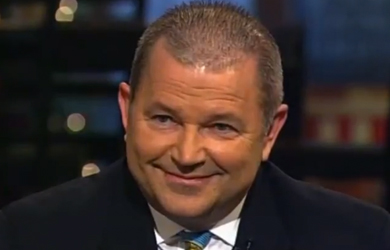Last year, during the debate over curriculum standards in Texas, we came across a quote from John Fea, Associate Professor of American History at Messiah College in Pennsylvania, on the way in which David Barton misuses and misrepresents history to further his Religious Right agenda:
“I’m an evangelical Christian, and I think David Barton and Peter Marshall are completely out to lunch. They are not experts on social studies and history. Neither of them are trained in history. They are preachers who use the past and history as a means of promoting a political agenda in the present.”
Last month, Fea released a book entitled “Was America Founded As a Christian Nation?: A Historical Introduction” that he hopes will become a valuable resource between those who claim that America was founded to be a Christian nation and those who assert it was designed to be a purely secular state.
I received a copy of it last week and eagerly read through it and Fea’s conclusion is that the question is complex and the answers are mixed in that Christian ideas and the Christian faith most certainly did play a important role in the founding of this nation, but that neither the Declaration of Independence nor the Constitution can be considered Christian documents and that many of the Founding Fathers, while considering themselves to be Christians, held a variety of views that were deeply at odds with Christian orthodoxy.
I will be posting excerpts throughout the week, but for the purposes of this post, I want to highlight a few paragraphs relevant to David Barton and his fundamental misuse of history:
The discipline of history was never meant to function as a means of getting one’s political point across or convincing people to join a cause. Yet Americans use the past for these purposes all the time. Such an approach to the past can easily degenerate into a form of propaganda or, as the historian Bernard Bailyn described it, “indoctrination by historical example.”
This sort of present-mindedness is very common among those Christian writers and preachers who defend the idea that America was founded as a Christian nation. They enter the past with the preconceived purpose of trying to find the religious roots of the United States. If they are indeed able to gather evidence suggesting that the founders were Christians or believed that the promotion of religion was important to the success of the Republic, then they have gotten all that they need from the past. It has served them adequately as a tool from promoting a particular twenty-first century political agenda. It has provided ammunition to win the cultural war they are engaged in …
Such an approach to the past is more suitable for a lawyer than for a historian. In fact, David Barton, one of the leading proponents of “Christian America,” counter his opponents by suggesting that his research is done in accordance with the practices of the legal profession. Barton “let’s the Founders speak for themselves in accordance with the legal rules of evidence.” The difference between how a lawyer uses the past and how a historian interprets the past is huge. The lawyer cares about the past only to the degree that he or she can use the legal decision in the past to win a complex case in the present. A lawyer does not reconstruct the past in all its complexity, but rather cherry-picks from the past in order to obtain a positive result for his or her client. Context, change over time, causality, contingency, and complexity are not as important as letting the Founders speak for themselves,” even if such speaking violates every rule of historical inquiry. The historian, however, does not encounter the past in this way.
…
For these writers revisionism is not only about the practice of removing references to God from the narratives historians tell about the past, but also about the way historians treat their sources. Revisionism is dangerous because it implies looking critically at primary sources rather than simply accepting them as face value. For example, if Puritans believed that they were God’s new Israel, and this assertion can be supported by primary documents, then it must be true that the Puritans were indeed God’s new Israel. Good historians must always believe what the primary sources tell them. Such an approach does not allow a place for any type of theological critique of those sources. If John Witherspoon, the only minister to sign the Declaration of Independence, wrote that God was on the side of the patriots in the American Revolution, then it must be true – a theological certainty – that God was on the side of America. To suggest that Witherspoon was wrong or misguided is the kind of interpretative work these writers such as a mark of dangerous revisionism.
The fear of revisionism is why the defenders of Christian America make such a big deal about grounding their research in primary sources. If a historian makes an argument based on the ideas of another historian’s work, rather than the primary sources, then she has succumbed to revisionism. Barton calls his historical method a “best evidence” approach. This way of dealing with evidence allows him to let the founders speak for themselves, but it rarely explores deeply the context in which such words were uttered.








